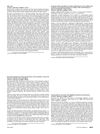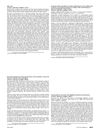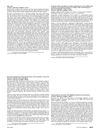24 citations,
August 2022 in “Immunity” Type 2 immunity helps control mite growth in hair follicles, preventing damage.
[object Object] 181 citations,
December 2017 in “Trends in immunology” Intestinal intraepithelial lymphocytes are crucial for gut immunity and maintaining the mucosal barrier.
91 citations,
January 2010 in “Journal of Allergy and Clinical Immunology” NK cells play a role in skin diseases like eczema and psoriasis.
 5 citations,
February 2022 in “International Journal of Molecular Sciences”
5 citations,
February 2022 in “International Journal of Molecular Sciences” Different immune cells like platelets, mast cells, neutrophils, macrophages, T cells, B cells, and innate lymphoid cells all play roles in skin wound healing, but more research is needed due to inconsistent results and the complex nature of the immune response.
June 2020 in “Comparative medicine” NSG mice had the most mites, and genetic factors affect immune response and susceptibility.
 March 2012 in “Journal of The American Academy of Dermatology”
March 2012 in “Journal of The American Academy of Dermatology” Hair casts are often mistaken for head lice, scalp pain in hair loss is linked to certain nerve factors, eyelash growth treatment is safe and effective, and nail shedding in children may follow hand-foot-mouth disease.
 March 2012 in “Journal of The American Academy of Dermatology”
March 2012 in “Journal of The American Academy of Dermatology” Higher levels of certain nerve-related proteins are linked to hair loss in women with scalp pain.
 March 2012 in “Journal of The American Academy of Dermatology”
March 2012 in “Journal of The American Academy of Dermatology” Hand-foot-mouth disease may cause nail loss in children.
 2 citations,
July 2022 in “Frontiers in Medicine”
2 citations,
July 2022 in “Frontiers in Medicine” The cause of Frontal fibrosing alopecia, a type of hair loss, is complex, likely involving immune responses and genetics, but is not fully understood.
 26 citations,
December 2015 in “International Journal of Dermatology”
26 citations,
December 2015 in “International Journal of Dermatology” Trichodynia is a painful scalp condition linked to hair loss and inflammation, often with anxiety, affecting more women and needing better treatment options.
 16 citations,
December 2012 in “The Clinical Journal of Pain”
16 citations,
December 2012 in “The Clinical Journal of Pain” Chronic scalp pain in trichodynia involves both body-wide and localized increased pain sensitivity.
 March 2012 in “Journal of The American Academy of Dermatology”
March 2012 in “Journal of The American Academy of Dermatology” Latisse is safe and effective for long-term eyelash growth in people with thin eyelashes from chemotherapy or unknown causes.
12 citations,
May 2015 in “Journal of the National Comprehensive Cancer Network” Doctors should actively prevent and treat skin side effects in cancer patients to keep them on the best medication and reduce discomfort.
 32 citations,
January 2017 in “Orphanet journal of rare diseases”
32 citations,
January 2017 in “Orphanet journal of rare diseases” FOXN1 gene mutations cause a rare, severe immune disease treatable with cell or tissue transplants.
 49 citations,
February 2008 in “Stem Cells”
49 citations,
February 2008 in “Stem Cells” Wnt10b helps blood stem cells grow after injury.
 5 citations,
January 2022 in “PloS one”
5 citations,
January 2022 in “PloS one” Deleting the p63 gene in certain cells causes problems in thymus development and severe hair loss in mice.
 January 2025 in “Journal of the Egyptian Womenʼs Dermatologic Society”
January 2025 in “Journal of the Egyptian Womenʼs Dermatologic Society” Higher substance P levels may cause discomfort in hair loss patients.
 October 2023 in “International journal of biology, pharmacy and allied sciences”
October 2023 in “International journal of biology, pharmacy and allied sciences” Personalized treatment plans combining natural and synthetic approaches are important for managing alopecia effectively.
[object Object] 79 citations,
December 2013 in “Journal of Investigative Dermatology Symposium Proceedings” Alopecia areata may be treated by restoring hair follicle immune privilege and adjusting immune responses.












